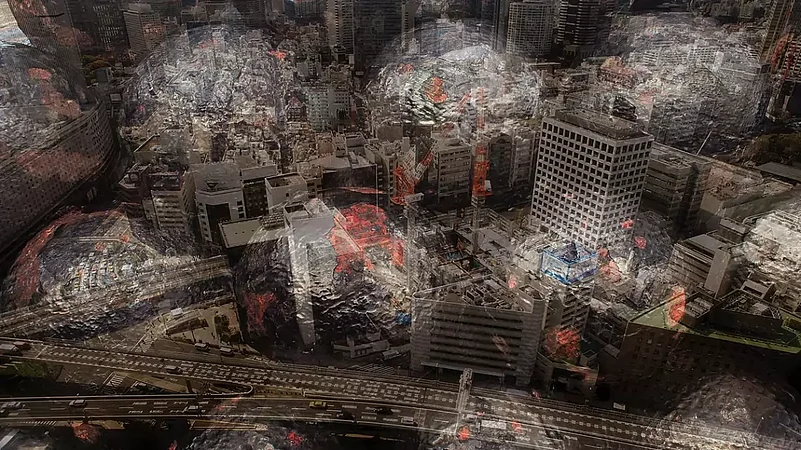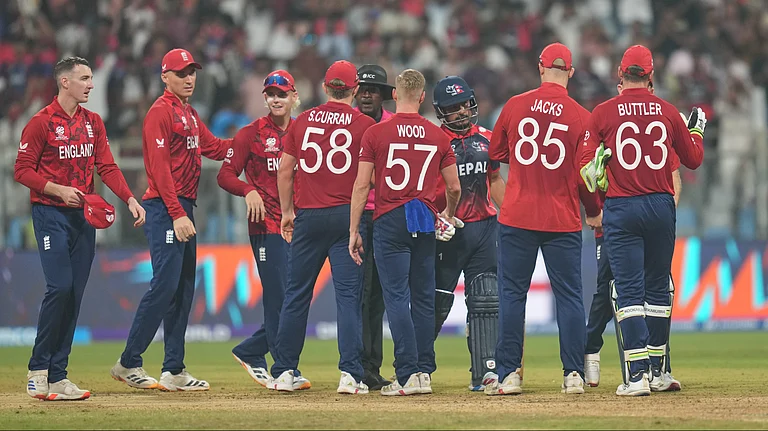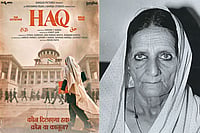The slanting sunrays lose their sting of September; they are mellow like the lions in the older national emblem; benign with their thick grinning whiskers; and, not snarling and sabre-toothed like the new avatar. The wind no longer feels like a slap across the face, but a zephyr, its sweet embrace is soothing and languorous, with political pundits trying to gauge which way it’s blowing. Plump Mexican silk cotton flowers twirl down from the high branches, like Vishnu’s Sudarshan Chakra, sans the firepower, landing silently to make a spongy, pink-purple carpet. The neem and the pilkhan have a blow-dried look, the generous rains and the assorted acids in the air have bleached them to an indescribable green. The parakeets and the barbets, the treepies and the hornbills, the doves and the babblers chirp around, merrily flying hither and thither as if they are in Ashoka Vatika.
There is peace in the mind, warmth in the heart and a zing in people’s step as the festive season is approaching. The entire city is bathed in brotherhood and camaraderie. Shouts of ‘Ram, Ram, Puran Kaka, sab khairiyat?’ ‘Haan, haan Khan Chacha, aap ke aashirwad se’ ring the air. The Gang-Jamuni tehzeeb is at its zenith. The barrier between castes has been long broken. Crime has been bulldozed. Class difference is so minuscule that even Engels will need a magnifying glass to detect it. Wherever there are men, there are 33 women too. The following scene is typical of a day in this just and kind society.
At a traffic signal, a gig worker loses his balance on his bike and falls because of a tent-sized package on his back. A Bentley screeches to a halt, the man at the wheel, a clean-cut millennial in a sheer linen jacket that discreetly reveals his rippled gym-toned muscles, picks him up and rushes to the nearest hospital. The free, super-speciality hospital is a shiny building built for the middle-class (there are no more poor, garibi has been hataoed long ago) with cutting-edge equipment and doctors from all over the world. The police picket outside the hospital, especially kept for accident victims, takes over from there. The constable runs to the Bentley owner’s help, picks up the gig worker and dashes through the hospital corridors to inform the dean about an emergency. No paperwork is needed; the biometric of the gig worker is already in the hospital’s database, updated up to what he had had for breakfast that morning. He is wheeled in to an emergency room; a hundred doctors (33 of them women) and nurses attend to his few bruises on the elbow and knees; and, to overcome the shock, he is taken to another room with a plush bed, a mini fridge, silent air conditioning and a big TV (on which The Truman Show is playing). Ten minutes later, he is discharged with fresh dressing and a packet of millet biscuits.
Meanwhile, the insurance agent has come to the spot; he quickly assesses the damage to the bike and sends it to the workshop. The motorcycle company tells the worker that they will give him a new bike while the old one is mended. The gig company transfers a handsome compensation to his UPI account for the trauma he has endured while on duty. The Bentley has been patiently waiting outside the hospital gate to drop him back home.
Gonzo observes this whole episode from her car and thinks nothing of it. In this kaal, it would have been news if the Bentley had not stopped, if the cop had not rushed, if the hospital, the insurance firm, the gig aggregator had not acted swiftly. There is nothing to report here, so she drives through a labyrinth of smooth (‘as Hema Malini’s cheeks’) flyovers, spotless underpasses and gigantic cantilever bridges, humming an old jingle, ‘Happy days are here again, everybody is feeling great on Thumbs Up! Refreshing cola, refreshing cola…’
Gonzo can see the news organisation she works for on the horizon, majestic and imposing, situated in the Fourth Estate plot of Greater Meerut—the Khabardar.
Recently the old office has been vacated and a huge swanky building of chrome and glass has come in its place to reflect the new brand of news, what is called Cheerful New News, or CNN for short. This comes under the new act, Negative News (Prevention), popularly called Pen. As Gonzo walks into the reception, a Pragyan-like rover struts out to scan her. As she walks in, the newsroom is buzzing with excitement and positive energy. Everybody looks blessed. The Chief Clickbaiter (or CC as the chief editor of Khabardar is now called under the CNN property) is like a caged tiger in his swivel chair, raring to unleash his animal spirit, to snap up whatever good news there is.
The agenda in the newsroom today is how to spread even more cheer and happiness than what already exists among the people in the coming festive season. “Let’s send our reporters to all the 100 new flyways (33 of them only for women drivers) and get human interest stories of how it elevates them,” CC chimes in his low sweet-talk tone, just on the right side of a hiss. “One of them fell two days ago,” interjects Gonzo. “Where is your sense of proportion, Gonzo? Of course, a few will fall when so many of them are being built. You have the tendency to focus on the mundane and the unimportant. Besides, the Pen may get us,” CC says, an edge coming to the sweetness. This is ‘journalism of discourage’ thinks Gonzo, but doesn’t say it out aloud.
“We should also do in-depth, investigative reports on how well the free, super speciality hospitals are functioning,” continues CC. “Who wants to take up this challenging story”? Some 10 hands go up (three of them women) of the blessed reporters. Gonzo is about to raise the case of such a hospital where two dozen children died due to negligence, but checks herself—she knows Pen is hanging like a sword over her head.
“Shouldn’t we also look at the new highways along with the flyways?” asks one of the effervescent reporters. “What a brilliant idea! Yes, absolutely. It will give variety and depth to our coverage,” coos CC, spinning in his chair, back in his element. This gives a cue to the others and so the edit meeting continues—brainstorming story ideas on free housing, free toilets, free gas, free water, free education, free bus, free power, free data, free cookers, free TVs, free cycles and free lunch. Freedom after all means to be free from these everyday niggles.
(This appeared in the print as 'Thumbs Up!')



























